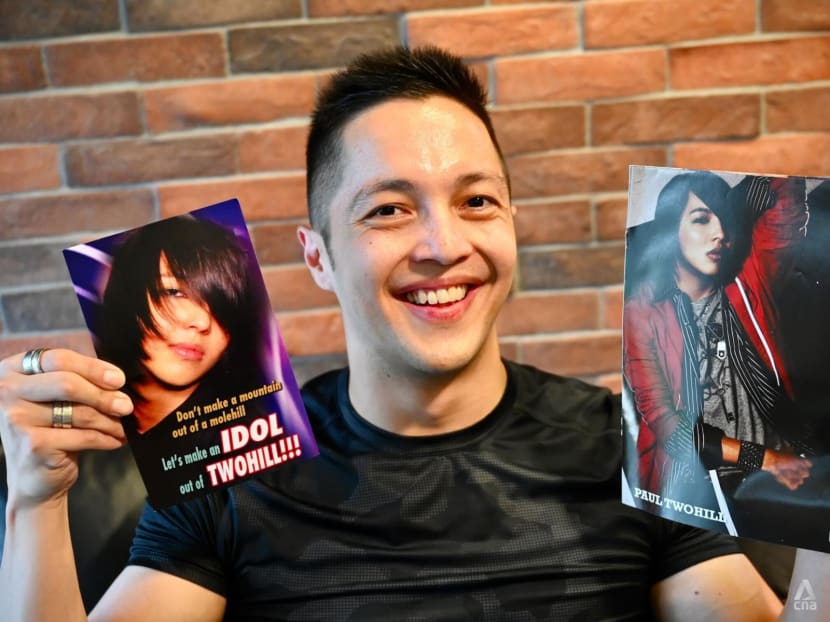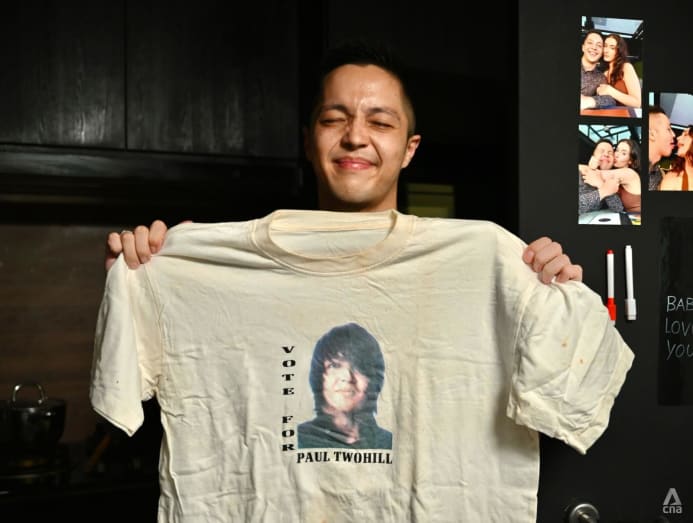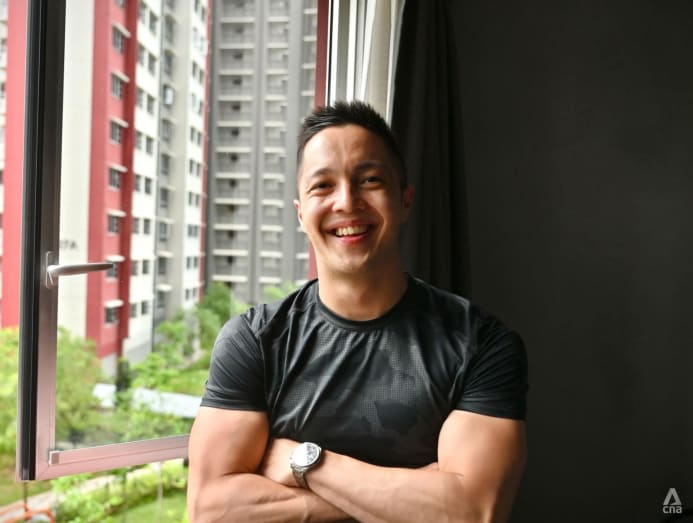He didn't have the talent to justify the attention, says former Singapore Idol favourite Paul Twohill
The perks of fame came together with its peculiarities. For Mr Paul Twohill, this included waking up in his boxer shorts to wide-eyed fans gawking at him in his bedroom.

Former Singapore Idol contestant Paul Twohill showing memorabilia and a magazine cover of himself on Apr 1, 2025. (Photo: CNA/Lauren Chian)

This audio is generated by an AI tool.
Despite having only a half-decent voice, 17-year-old Paul Twohill knew one thing was for certain when he stepped onto the Singapore Idol stage all those years ago: fans would go berserk and bellow his name.
As a contestant on the second season of the reality show and singing competition, Mr Twohill's punk rock aura and his trademark Justin Bieber-esque fringe – which covered half his face – made him stand out from the rest of the participants.
His prominent braces and dorky quips only served to enhance his likeability. Somehow, nothing he did then could diminish his popularity.
Perhaps that was why he always seemed larger than life to me, who was 10 years old at the time and watched every episode on television with rapt attention.
Fast forward 16 years to 2022 and I found myself, then a part-time English tutor in a tuition centre where I was teaching classes, shaking hands with “Teacher Paul”.
I recalled squinting my eyes briefly to take a closer look at "Teacher Paul" who had a deep voice, the vibe of a well-adjusted man and clean-cut trim on his head. Gone were those signature braces, too.
I approached him later that day after his students had waved him goodbye because I just had to know: “Are you … ?”
“Yes I am,” he said with a chuckle. “I get that a lot.”
Mr Twohill's new stage was the front of a classroom and his audience was no longer made up of screaming admirers but mischievous children under 12 who are generally harder to please.
For the last seven years, he has been an English teacher in an enrichment centre. Now 36 years old, he moved to Australia in February this year where he is pursuing an 18-month master’s degree in applied learning and teaching.
We met up at his Singapore home in April for a proper sit-down interview during a university term break, and I found it quite fitting that his four-room flat in Ang Mo Kio was stylish but somewhat jumbled, because conversations with Mr Twohill can often feel that way.
Over several video calls before meeting in person, our conversations covered everything from education to politics. His light-hearted stories were peppered with some wry humour, interspersed frequently with bursts of passionate debate.
However, that day at his home where he lives alone, we were determined to stick to the script.
SHOCK OF WAKING UP TO OBSESSED FANS
When I asked him to describe what it was like being a teenage pop idol, Mr Twohill said it was an "incredible experience".
“You had thousands of fans screaming, running up to the Singapore Idol van after filming, people writing your name on vending machines,” he said beaming.
He still keeps boxes full of memorabilia and magazine clippings featuring him from 2006 but the main contents are the troves of handwritten letters from fans. He reckoned there were hundreds of them.
At the peak of his popularity, just walking from one end of Orchard Road to the other would take him two to three hours because he had to stop to sign autographs and take pictures with fans.
There were also some dicey situations. For every hundred fan letters he received, he would get a handful of hostile text messages and even death threats.
Once, a man even lunged to attack him in public.
“I've had phone calls where I apparently made someone pregnant, but I've never met them in my life. There was once I was out in the wee hours of the morning and a guy wanted to beat me up.
“I've also been told by a producer during a road show that a guy ran over and literally tried to stab me and another contestant. I didn't even know, I was busy waving around,” he said.
He admitted that there was a lot of social anxiety that came with the attention and that led him to want to stay home "a lot of times".
He quickly pointed out, though, that even being at home was not a surefire way to shield himself from the public eye.
“I used to live on the second floor and fans used to hang around downstairs,” he said.
“This particular day, I woke up from a nap and there were people in my room! It was a precarious situation … I was only in my boxers.”
Some secondary school girls had lied to his aunt that they were his friends and she opened the door to let them into the apartment.
“Obviously, I covered myself up and politely asked them to exit the room so I could get dressed … I entertained them for a little bit, then asked them to leave because I had schoolwork to do.”

It wasn’t just star-struck teenagers who wanted him in their midst.
Mr Twohill said he received one admission offer from a school in 2006 before his Singapore Idol appearances.
In 2007 at the height of his popularity, polytechnics in Singapore caught wind that he intended to pursue a diploma in mass communication and offers from all five institutions here fell on his lap.
Brands aplenty approached him to sign sponsorships and record deals. At one point, he signed a deal with producer John Klass – now a deejay with Gold 905 radio station – and produced a song that was number one on Singapore radio charts for three weeks.
“The possibilities seemed endless,” he recounted.
For the teenager who once dreamed of marrying pop icon Britney Spears and becoming a bonafide celebrity, he had gotten almost everything he ever wanted (bar Britney Twohill).
The irony? He didn’t think he deserved any of it.
“I personally don’t think, to this day, that I had the level of talent to justify having that amount of fame.
“In this day and age, you see so many singers who are 17 or 18 and they are really great.
“It was different back then. Your penetration point (to fame) was low and you had to bank on luck – and many other things.”
THE DOWNSIDE OF FAME
Exactly how and why he became such a popular figure is something Mr Twohill has spent a fair bit of time examining. He had even written an essay in university searching for the answers to these questions.
He surmised in that reflection: “Celebrities and stars are created by the mass media to satisfy the requirement of commercial interests.”
While he tried his best to be true to himself, Mr Twohill believed that he was ultimately a “tool” to generate interest for the reality show.
“I was first presented to the public as an ‘emo’ punk rocker ... long hair, punk clothes, with a persona portrayed as goofy, eccentric and relatively queer,” he said.
“Everything from song choice to my mannerisms in public were, at times, controlled by producers to what they deemed appropriate to further ‘market’ my image and trademarks.”
For instance, when asked to put up an item for a charity auction, his suggestion of auctioning a guitar was waved off in favour of a pair of used boxer shorts – reason being that he had to be more “humorous” than inspirational.
He was also often required to wear specific sponsored clothing to suit this “style”.
The struggle to be authentic is only half the baggage that comes with being a popular figure. He was also introduced to a world of vice even before he turned 18.
Mr Twohill recalled being invited to parties, movie premieres and clubs almost every week, where alcohol and infidelity, he learned, were standard items on the menu of those who were famous personalities.
At one of these events, he was even molested by an adult in the fashion industry. At the time, he felt that he had no choice but to shrug off and move on from the incident, he said.
He picked up drinking at an early age to try and overcome his anxieties and to socialise better – a skill he felt was required of someone in the entertainment field.
“For most people, it’s difficult enough to handle the social dynamics when they enter secondary school – and this was on another level.
“I was 17. I was still studying. I had to learn the way the industry works and how to navigate around it. In gist, I felt it was a very accelerated social learning process.”
That pressure to conform to a curated persona has stuck with him to this day.
“Even right now as I'm on camera, I have this tendency to want to be goofy, but I’m not really like that. I’m quite intense,” he said.
“I don't bring out this side of me often because I feel like it can be intimidating. It’s easier to navigate social situations when I'm just taking it more lightly and usually, a joke helps.
“If anything, I was goofy (on stage) because at my core, I want to make people happy.”
THE MAKING OF TEACHER PAUL
In one of our earlier conversations, Mr Twohill was quick to bring up the topic on “ikigai” – a Japanese concept that roughly translates to a person’s reason to live.
He spoke of his own “ikigai”, explaining why life has taken him from the noise of show business to the relative quietude of a field where he is an educator.

Since graduating from RMIT University Singapore where he studied mass communications in 2014, he has dipped his toes in different industries but continued his job as a part-time host on reality lifestyle channel Click Network, which he joined in 2007.
Though his infectious personality in several web series such as Chick vs Dick and Wonder Boys helped Click Network's YouTube channel reach a million subscribers, he walked away from that world in 2017 when he decided to become a teacher.
“I just didn’t think the content was always appropriate for children,” he said.
“And I didn’t want what I’d done in the past to bleed into how I’d be perceived in this new career.”
Does it still happen? I had recognised him back in 2022 after all.
He said with a smirk: “Sometimes the parents show my old videos to their kids, and then the kids come in and tease me.
“But they still keep sending their kids to me. And that to me is the ultimate validation that I did something right back then.”
It was there, during his seven-year stint as a teacher at Jan & Elly English Language School, where he said he found not just his purpose, but his peace.
He told me with conviction that he intends to continue teaching upon graduation from his master's programme next year.
“I remember asking myself, if I were going to die tomorrow, what is the one thing that would fulfil all the different elements of what I want to pursue in my life – and that was teaching.
“I’ve always wanted to bring joy to people and impart good things to people. It’s fulfilling to inspire young minds and in my quest for knowledge as a teacher, I also get to learn,” he said.
Just then, I paused for a brief moment to ponder about the polarity between his public persona and the introspective man sitting next to me.
That thought was swiftly broken by a quip and a grin from him.
“And then, of course, there’s bribery,” he exclaimed.
“I get to give the kids Pokemon cards and they’ll say, ‘Wah, this teacher is the best teacher'.”
As we wrapped up the interview, I realised that his seemingly "jumbled" persona was just two versions of Mr Twohill living simultaneously within a vessel, with either one appearing when fitting to live out his mission in life to make others happy.
In one breath, he could recount wild, absurd stories from his heyday.
In the next, he would speak with conviction about pedagogy and how to make learning joyful.
Harkening back to his time as a Singapore Idol personality, I asked him about the most memorable placard a fan made for him and his answer was more than apropos.
“Who needs one hill when you've got two?”













